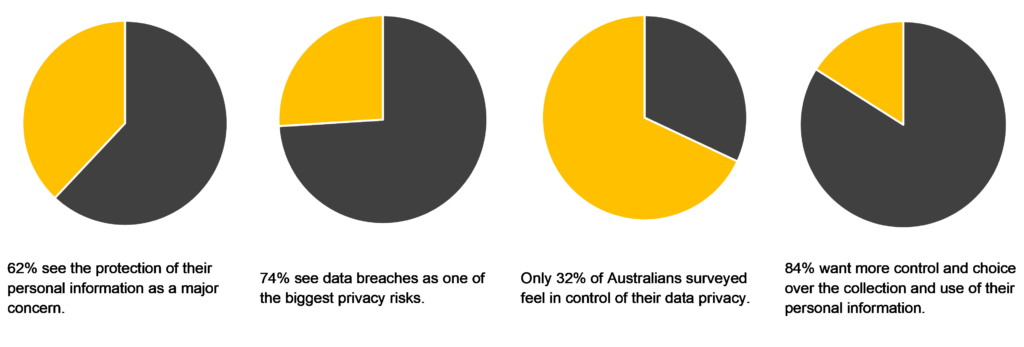The statistics are in. The Office of the Australian Information Commissioner (OAIC) conducted a survey of Australians this year and the results show privacy is a growing concern and priority for Australians.
- 62% of Australians surveyed see the protection of their personal information as a major concern in their life;
- 74% of Australians surveyed consider data breaches to be one of the biggest privacy risks they face today;
- Only 32% of Australians surveyed feel in control of their data privacy; and
- 84% of Australians surveyed want more control and choice over the collection and use of their personal information.1

How to prioritise privacy and build trust with stakeholders
Privacy is inherently about trust and identity. By sharing personal information about themselves with your organisation, individuals are placing trust in your organisation that you will respect their identity – our information or data is an extension of self-expression and identity.
To grow this trust, we recommend organisations:
- Review their privacy policy to ensure it reflects current information handling practices. The requirement to have a privacy policy is based on openness and transparency about information handling practices.
- Implement tailored, clear and concise collection statements. This will address the desire for more control and choice over the collection of personal information.
- Only collect the information you actually need. In addition to this being recommended to reduce risks of data breaches impacting greater swathes of data, and a requirement under certain privacy legislation2, it builds trust in your stakeholders. The OAIC’s survey found less than half of people trust organisations to only collect the information they need.
Where to start in making privacy a priority
As a starting point to take steps in making privacy a priority, you can:
- Review the detailed legislative guidance published by the OAIC for information about privacy policies and collection notices;
- Embed a culture of Privacy Impact Assessments and privacy-by-design; and
- Map how and where your organisation collects and stores personal information.
How we can help
We know you are busy. We know many of our clients include the role of Privacy Officer in a broader risk and compliance role. We can support you with directions of how to start through our online publications – such as our Privacy Toolkit – or we can take on these projects for you. This can be a full privacy audit that will start with mapping your data assets, reviewing your information handling practices and processes, and proposing changes to systems and policies. Alternatively, we can discuss what other projects may look like for your organisation and design a tailored offering to your needs. More details about how we can help with privacy and data security is here.
Contact us
Please contact us for more detailed and tailored help.
Subscribe to our email updates and receive our articles directly in your inbox.
Disclaimer: This article provides general information only and is not intended to constitute legal advice. You should seek legal advice regarding the application of the law to you or your organisation.
1 The 2023 Australian Community Attitudes to Privacy Survey
2 For example, the Health Records Act 2001 (Vic).